There are a lot of factors that can change your happiness every day. In fact, the list of happiness factors is endless, as happiness is as unique as we are ourselves. However, there are 5 factors that are fundamentally and universally the most important factors of happiness. These are called the pillars of happiness.
So what are these pillars of happiness? Here are the 5 pillars of happiness that you need in your life if you want to be happy:
- Confidence and self-love
- Meaning and purpose
- Positivity and optimism
- Physical and mental health
- Freedom and independence
This article covers these pillars of happiness in-depth to give you an idea of why they are so important. The truth is, you can be happy without one of these pillars, but if you’re looking to live the longest and happiest life you can then it’s crucial to focus on these pillars of happiness first.
Contents
The pillars of happiness
You might be wondering: “what are these pillars and why should I care?”
I understand that this is a very subjective topic and it might be hard to imagine, but the pillars of happiness are certain factors that are considered to be fundamental to your happiness.
What does this mean? It means that without these fundamental happiness factors – pillars – it will be difficult to find long-term happiness in your life. This might still sound very subjective, so I’ll give a couple of examples in a minute.
Let’s first have a look at each of the 5 pillars of happiness:
- Confidence and self-love
- Meaning and purpose
- Positivity and optimism
- Physical and mental health
- Freedom and independence
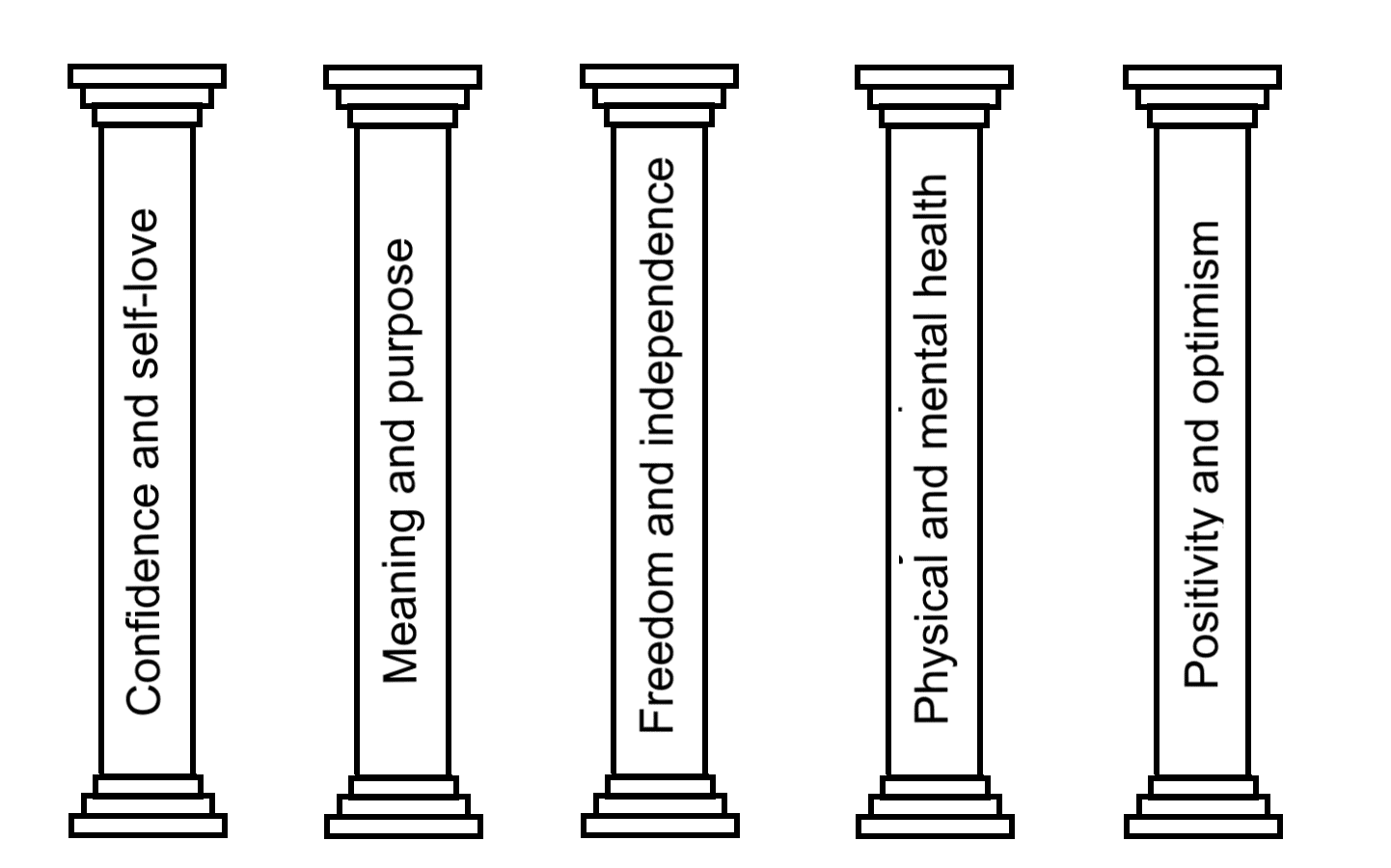
Each of these 5 pillars is critical if you want to be happy. Even though there is an endless list of things that can make you happy, these 5 specific things are fundamental. It’s not like you can’t be happy without them, but it is difficult to find long-term happiness if you’re missing one of these things in your life. That’s because every happiness factor besides these 5 fundamental factors is heavily influenced by them.
Let’s look at some example:
- If you’re lacking confidence and self-love in your life, then any relationship you have with others will be less powerful.
- If you are not physically healthy, then any amount of exercising or sport will have a smaller positive influence on your life.
- If you don’t know what your purpose in life is, you’re lacking a sense of direction and achievement in the things that you do.
Let’s quickly look at the 5 pillars of happiness before further explaining why these things are so crucial to your happiness.
Pillar 1: Confidence and self-love
A lot of people struggle with confidence, probably more than you think. Us humans are good at keeping up appearances. Even when we feel like shit, we will always try our hardest to appear confident and happy from the outside. I believe everybody has done this at some point.
While this is not bad per definition, it’s important to know that true happiness can only be reached when we are at peace with ourselves for who we are. You need to be confident about who you are (and who you are not).
The most important step in becoming confident and self-loving is to stop comparing yourself with others. In this day and age, with the constant influence of social media, Instagram bullshit, and sketchy marketing, it’s actually very difficult to not get the feeling like you’re not special. There’s always somebody who claims to be more glamorous, outgoing and social. This is total bullshit.
If you’re currently feeling insecure, then please consider the following steps:
- Delete social media.
- Don’t share stories or pictures just for the sake of recognition and social validation.
- STOP comparing yourself to others. Comparison is the thief of joy.
- Teach yourself how to laugh about your own insecurities. Humor is a great way to deal with a lack of confidence.
- Talk to strangers, even if it’s just giving a compliment or saying “good morning”
- Dress nicely and don’t think about what others might think.
- Don’t procrastinate things that you’re slightly anxious about (like calling someone, or helping out a friend).
- Set small goals and achieve them one at a time
- Smile more
- Etc

Pillar 2: Meaning and purpose
Having a purpose in life is one of the fundamental factors of happiness. Without it, you’ll live your life less focused, less efficient and you’ll often feel restless and stressed because you don’t feel aligned with the things you do. This article is about different purposes in life, with actual examples and how you can define your purpose in life.
What are some examples of a purpose in life? There are a lot of commonly known purposes in life, like:
- Providing for your family
- Living a successful life
- Making positive connections with others and enjoying those around you
- Traveling the world
- Fighting the declining condition of our planet
- Etc
But what is YOUR purpose? You can’t just copy & paste one of these purposes and call it a day. You have to find your own purpose in life.
My purpose in life is to live a long and happy life.
Sounds cheesy and anti-climatic? Maybe, but here’s the thing:
Everything that I do is a result of my purpose in life. There are a lot of other things that I feel are part of my purpose in life, like:
- Making others happy
- Making the world a better place
- Spending as much time as possible with the people I love
- Challenging myself intellectually and physically
But I only truly care about these things because they will eventually result in my main purpose, and that is to live a long and happy life.

Pillar 3: Positivity and optimism
A pessimist sees the negatives or the difficulty in every opportunity whereas an optimist sees the opportunity in every difficulty.
— Winston Churchill
Did you know that optimists are generally more successful and happier in life?
Despite this huge benefit to being an optimist, some people knowingly live their life as a pessimist. These people usually refer to themselves as “realists”, and while being critical to some scenarios does have value in life, it is not a good idea to be pessimistic by default.
If you are known as a pessimist, you may be leaving a lot of “happiness” on the table without knowing it. Sure, you might have your reasons for being a pessimist (ahum, realist) but if you’re looking at the world from a “glass-is-half-empty” perspective, you are sure to miss out on a lot of happy moments.
The truth is, whether you focus on something positive or negative is a choice. You often make this choice unconsciously, but that doesn’t mean you can’t influence this process.
Here’s a great example of choosing to be positive instead of negative. This story is from someone I met on the internet, I’ve asked her if I could share it here with you and she was okay with it:
Yesterday morning I was frustrated with my husband for starting the laundry the night before and then leaving it all to be folded in the wash room. He was trying to be helpful, but it created more work for me (a SAHM [stay at home mom] with an infant and toddler).
I was so mad. I felt angry that he didn’t finish the job and that I had to now do an extra chore I hadn’t planned to do. I opened my laptop to send him an e-mail (he can’t use his phone at work) and started typing a passive aggressive message: “Thanks for leaving all the laundry for me to fold. Not helpful.”
But before I sent it, I thought about how it would feel for him to read that message at the start of his work day. What kind of tone would that set for him? And then when he got home, for us?
I remembered on our honeymoon how we met a married couple in their 50s at a national park campground. They were so happy. And they seemed so in love and so positive. They told my husband and I that every day they just make the effort to treat each other as if they had just met. To extend the kindness they would extend to a stranger to one another.
I deleted my message, and instead, I typed “I hope you are having a good day so far. Can’t wait to see you when you get home. I love you so much.”
It felt so good to hit send.
When he got home, he told me how that message made his day.
I told him what I had initially planned to send and we were both able to laugh because by that time I had cooled off. He helped me fold the laundry and we had a wonderful night with our kids.
It’s so easy for us to make little comments and snips at our partners, but over time that chips away at the foundation. Pouring in love is much better.
This is an amazing example of how you sometimes can just choose to focus on something positive.
What I want you to know is that the most pessimistic person in the world will always succeed in finding something negative about a situation. As a result, you’ll always be unhappy. Therefore, having even a little bit of optimism and positivity is a fundamental factor of happiness. If you engage in situations with positive energy, your world will react much more positively as well.

Pillar 4: Physical and mental health
Good health is one of the most important factors for happiness. A lot of people will say that nothing is worth a damn without good physical and mental health. This is further supported by raw data. Year after year, the World Happiness Report shows us that a long and healthy life is highly correlated with the Happiness Index.
And it’s exactly the same for me personally. It’s rather straightforward. A lot of my worst days happened on days where I was in bad health. Challenging my body physically has always had a great positive effect on my happiness. If I were to become mentally and physically unhealthy tomorrow, a lot of my happiness factors would come tumbling down.
This is why a good level of physical and mental health is crucial for long-term happiness.
As a personal example, being physically fit allows me to do one of the things I love the most: long-distance running. Being able to run this much really adds a number of positive factors to my life:
- Running allows me to feel good about myself
- I get to challenge my body
- Running can be very meditative, especially after a long and busy week at the office
- Exercising gets me to blow off steam when stressed
- Etc
Without being healthy, I wouldn’t have all these positive factors in my life. That’s why being both mentally and physically fit is one of the 5 pillars of happiness.

Pillar 5: Freedom and independence
We all need to be in control of where our lives are going. More specifically, we need to be able to make decisions without being constrained by factors that we can’t control. Here are two examples of what I mean:
- If my manager at the office is suddenly replaced by an absolute psychopath, I want to have the ability to walk away from it and slowly look for another job.
- If someone in my family needs help or becomes sick, I want to be able to adjust my life to that in order to spend more time with them.
You might recognize how both examples have something to do with money.
You see, everybody needs money in order to maintain their life. We need it every day in order to do the things that we want to do. However, it’s not always the money we spend that allows us to be happy. More often than not, it’s the money that we don’t spend that brings us happiness.
I’m going to be honest here: the first thing I did when I landed my engineering job was to save enough money so that I wouldn’t live paycheck to paycheck. After I reached that goal, I continued to save money until I had a decent “emergency fund”, something that would last me a couple of months if the hypothetical shit starts hitting the fan.
Why does this emergency fund make me happy? It’s not because I like staring at my bank account while imagining myself as Scrooge McDuck. No, this saved-up money makes me happy because it gives me a little bit of freedom and independence. The ability to make my own decisions without being dependent on someone else.
If you are living paycheck to paycheck, then you are at risk of losing a lot of the things that make you happy when things go south. Even though that so far hasn’t happened, it can still happen any day. That’s why being even a little bit free and independent is a crucial pillar of happiness, that unfortunately not a lot of people realize.

What’s so important about the pillars of happiness?
The best way to explain why the pillars of happiness are so important is to use an analogy.
Imagine that you’re back in Ancient Rome and want to build the highest tower in your village. You’ve decided that you’ll first build a platform that’s supported by pillars, upon which you’ll continue to build extra layers in order to reach great heights. Since we’re still in Ancient Rome, and reinforced concrete wasn’t yet invented, your layers will be stacked up like a pyramid in order to be structurally balanced. It’s clear now that you need a big foundation if you want to reach great heights.
Now think of this same analogy, but replace the following things:
- The structural pillars are now your 5 fundamental factors of happiness.
- The various layers that you plan to build upon your foundation are regular happiness factors (if you’re not sure what happiness factors are, here’s a good start).
- Your happiness is represented by the height of your construction.
By following this analogy, you’ll notice that you won’t be able to reach great heights (happiness) without building a foundation (pillars of happiness) that’s big enough.
Here’s what it looks like if your life is missing 2 pillars of happiness.
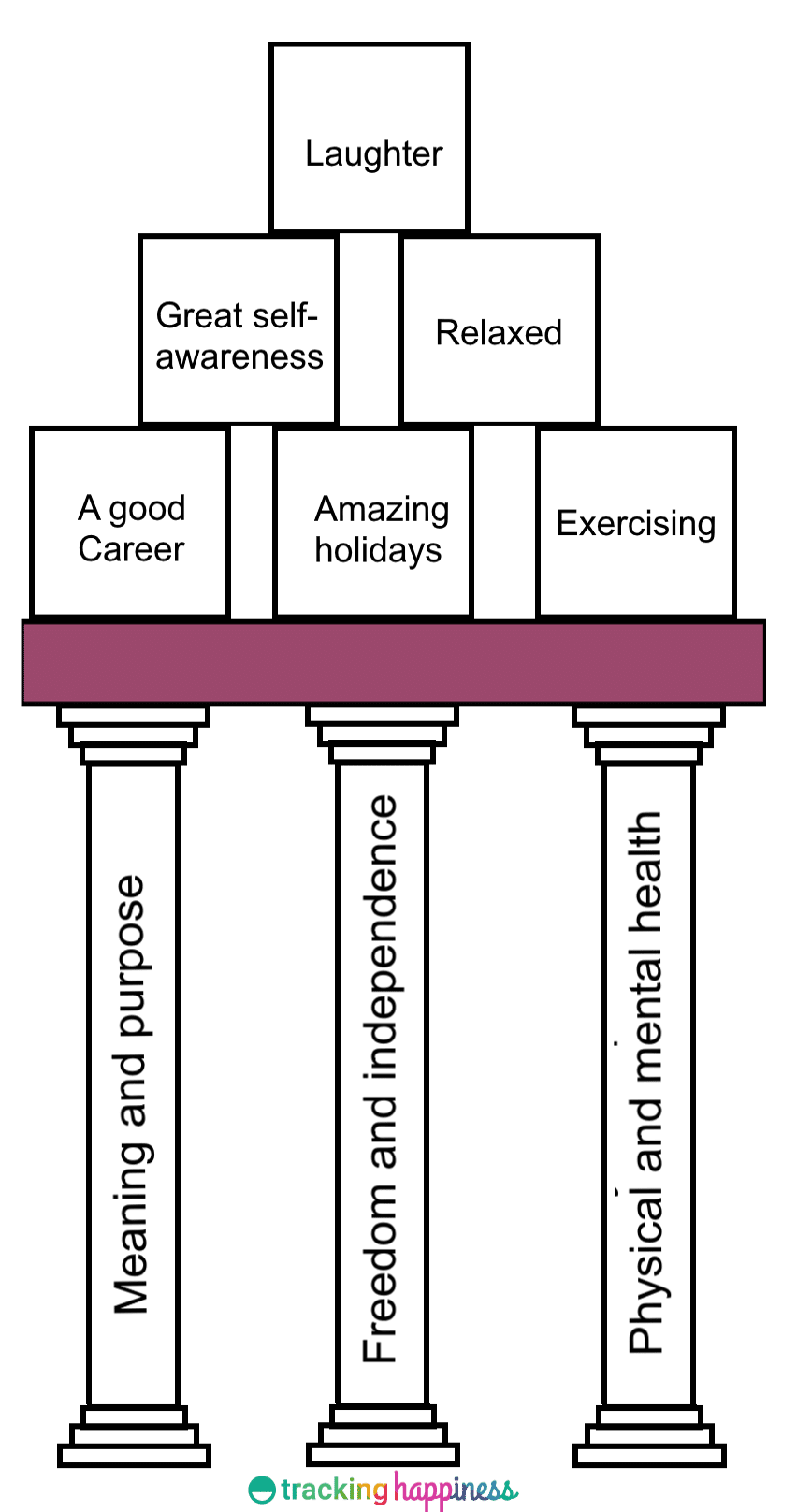
It’s not like you will be unhappy by definition, it’s just that your long-term happiness is limited to a certain height.
You can still be happy though! Hell, you can even be happier than someone that has all 5 pillars of happiness in her life. You can still try to fill your life with as many positive happiness factors as possible in order to reach great heights. If you were to do that, here’s what your happiness construction will look like:
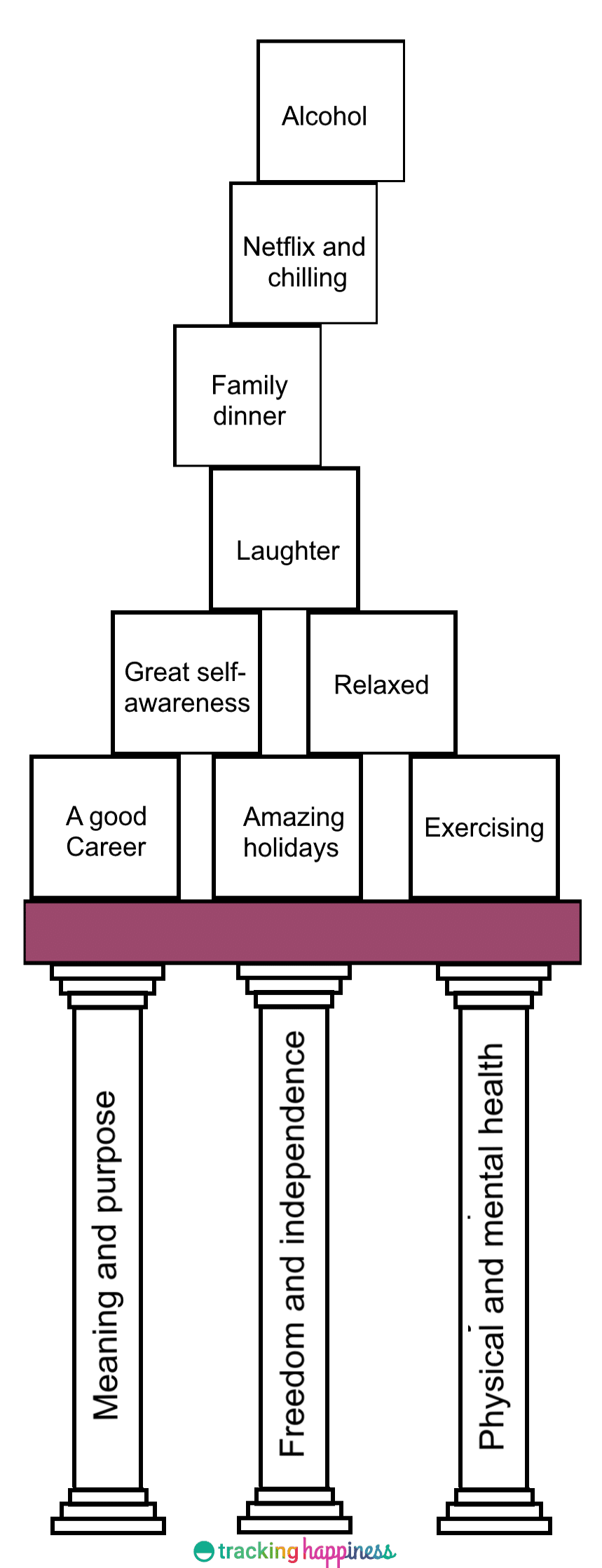
This construction is still really high, and it may even be bigger than other people’s happiness. But this construction doesn’t seem so stable, right? If the wind direction changes only slightly, then your happiness will come tumbling down like it wasn’t even there. Sure, you might be happy momentarily, but there is a big difference between short-term and long-term happiness. This post explains this difference quite well.
What I’m trying to explain here with this silly analogy, is that long-term happiness is best possible if you have all 5 pillars of happiness in your life. Here’s an example of what such a happiness construction might look like:
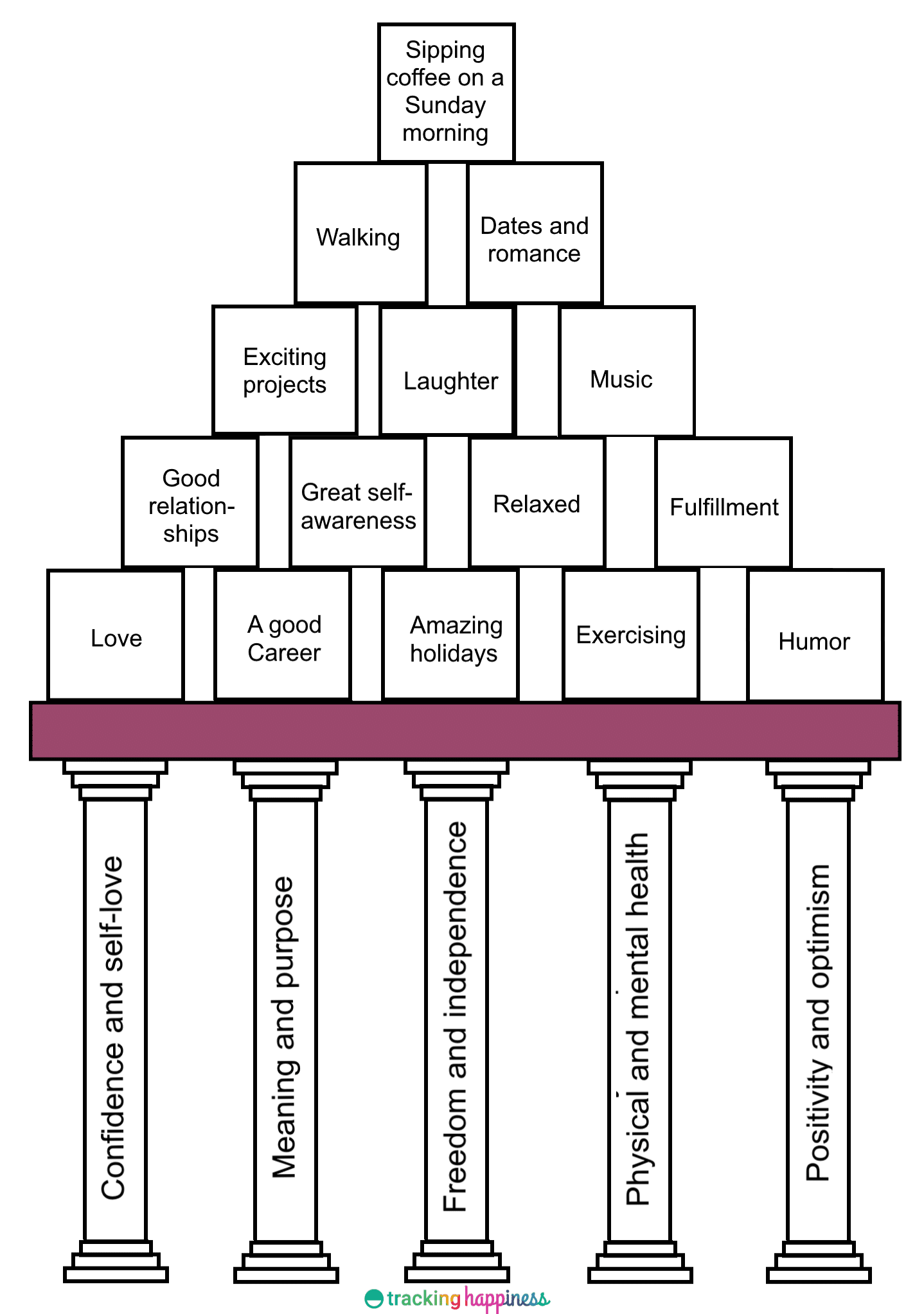
When your life contains all the 5 pillars of happiness, you’re much better able to build long-term happiness.
So if you’ve diagnosed that your life is missing one or two of these pillars, then I hope you know what to do now. Instead of focussing on stacking regular blocks of happiness on your limited foundation, it’s much better to focus on building the missing pillars! Don’t focus on short-term happiness if you have no shot at long-term happiness yet. Even though building the missing pillars of happiness might be a lot harder than other factors of your life, it will definitely pay off in the end.
Tracking my happiness shows me the state of my pillars
There you have it.
These are the pillars of happiness and why I think you need them if you want to build long-term happiness.
On a final note, I want to mention here that I’ve been tracking my happiness for over 5 years now. What does this mean? It means I spend 2 minutes every day reflecting on my day:
- How happy was I on a scale from 1 to 10?
- What factors had a significant effect on my happiness?
- I clear my head by jotting down all my thoughts in my happiness journal.
This allows me to constantly learn from my own happiness. By looking back at my happiness journal, I can see what exactly made me happy and how much it influenced my life at the time. This allows me to have a better understanding of each pillar of happiness in my life. If I notice that something is missing through my happiness journal, I generally know exactly what I need to fix in order to “repair” my life.
And I believe you can do the same.
Closing words
Whether you’re happy or unhappy at this moment, it doesn’t matter: you can benefit from strengthening your pillars of happiness. I hope you now know how these fundamental happiness factors can allow you to live the longest and happiest life you can. We all deserve to be happy, but there’s a lot that we can do every day in order to steer our life in the best direction possible.
With that said, I’d love to hear more from you. How would your current “happiness construction” look like? Are you missing a pillar of happiness that’s keeping you from finding long-term happiness? Or are you pretty happy with your current situation already? Let me know in the comments below!

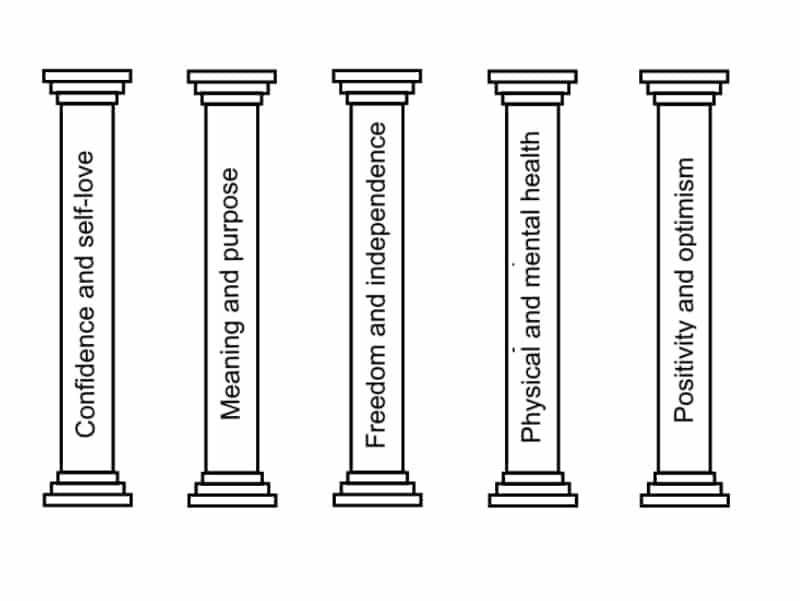
WOW. That’s what I call an eye opening article. Thank you.
Thanks for the kind words, John! 🙂
This is a great post! I love how you emphasize the value of building a strong foundation and delaying gratification rather than trying to fill the void with pleasure. Thank you for your work!
Thanks for the kind words Trey